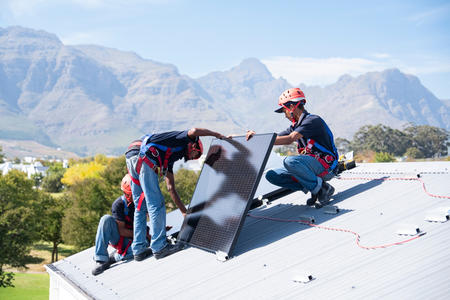Tell us about Western Cape government’s journey to a net zero future
Globally, climate change is being recognized as an emergency with immediate systems change required to achieve a livable sustainable future for current and coming generations. The Western Cape Province in South Africa is already experiencing the impacts of climate change manifested as droughts, floods and fires and these are undermining our social and economic developmental gains.
As such, an accelerated response is required to address the threat and capitalize on opportunities presented by climate change across the Western Cape - the latter being key to economic recovery and aspirations of a regional green economy hub.
We have made a strong commitment towards becoming a climate resilient and net zero emission province by 2050 in our 2023 Western Cape Climate Change Response Strategy: Vision 2050. This commitment has now been mainstreamed in the Provincial Strategic Plan, the Western Cape Growth for Jobs Strategy (2023) and OneHealth (2023) among others.
The need for energy resilience and sustainability is driving investment and innovation in renewable energy sources across all sectors, including industrial, commercial, residential and transport related activities. With energy contributing over 85% of all greenhouse gas (GHG) emissions in the Western Cape, this is a sector that requires a significant amount of investment and attention in the short term.
We are also focusing on efficiencies within our own office buildings, healthcare facilities and schools, which feeds into our emission reduction programs. There is a strong focus on the rollout of rooftop PV on these facilities to ensure continued service delivery in an environment of unstable grid-based electricity supply in the country.

Why did Western Cape government decide to join the Under2 coalition?
We’ve been a signatory to the Under2 Coalition since 2017. In 2022, the Premier recommitted the region to the global drive to reduce emissions and build resilience within states and regions and publicly signed up to the ambitious goal of being a net zero province by 2050. Being part of a global network of sub-national governments is as enlightening as it has been encouraging. The Western Cape Government has welcomed the opportunity to share experiences, successes and learning points with other regions across the globe who are also grappling with climate change challenges. The need for a united global response, while still encouraging action at the local level is important in taking this work forward.
“Being part of a global network of sub-national governments is as enlightening as it has been encouraging. The Under2 Coalition has enabled The Western Cape government to share experiences, successes and learnings with other regions who are also grappling with climate change challenges.”
-Goosain Isaacs, Director: Climate Change, Western Cape Department of Environmental Affairs and Development Planning
What has this enabled Western Cape government to achieve?
The province is also taking a citizen-centric approach aimed at improving service delivery whilst building resilience to climate change impacts. To date, the Western Cape Government is rolling out a visioning exercise aimed at identifying 'resilience-end-states' for agriculture, water security, ecological and the built infrastructure which will lay a framework for the development of climate change adaptation pathways.
The Western Cape is not an industrial hub but has a strong agriculture sector and relies heavily on high quality natural resources for its appeal as a world class tourist destination. Our improved understanding of GHG sources, derived from the CO2 emissions database and inventory research, flags the percentage contribution of GHGs from the agriculture, forestry and other land use (AFOLU) sector as 5%.
Our 2050 strategy, as well as the Western Cape Climate Change Response Framework and Implementation Plan for the Agricultural Sector (2016), sets out a series of mid-to-long-term goals for emissions reduction in the agriculture sector and climate-smart farming practices. This is balanced by a strong biodiversity sector plan, to ensure the sustainability of one of the most diverse, but sensitive, natural heritage areas globally.